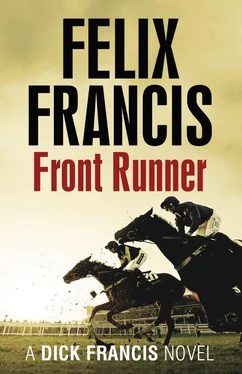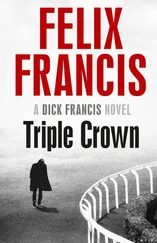Why then, at Haydock, had Dave opted to ride a waiting race, holding him up in the pack in a slowly run affair?
The racecourse stewards on the day had called in both trainer and jockey to explain the running of the horse. According to the notes in the file, the stewards had accepted the explanation offered that the horse had been held back due to a concern that the heavy going would have burnt him out too quickly in such a long race if he had been allowed to run more freely in the early stages.
But the horse had run exactly in that manner, and won, in a three-mile chase at Fontwell Park in September when the ground had been almost waterlogged and the going was described as ‘bottomless’. And Dave Swinton had ridden it that day too.
The second possible race had been at Ludlow, two days after the one at Haydock. Dave had ridden a horse called Chiltern Line and he had become badly boxed-in on the final turn and had been forced to drop back to get round other horses. He had subsequently failed to make up the lost ground, finishing second by half a length.
The only thing that made it of note was that Dave Swinton was such a good tactician in a race that getting himself badly boxed-in was something almost unheard of. If it had been almost anyone else in the saddle, I wouldn’t have looked at it twice.
Had Dave allowed himself to get boxed-in on purpose? But, if he’d been determined not to win the race, how could he have been sure that such a boxing-in would have occurred? Perhaps that was the genius of the man.
The third race was the one in which he had fallen at the last fence, even though part of me couldn’t understand how anyone, stuntmen aside, would cause a horse to fall on purpose, especially when the fall in question had been such a bad one.
Dave had been well in front on a horse called Newton Creek in a novice chase, also at Ludlow, when he had asked the horse to shorten and put in an extra stride when coming towards the last fence. The horse had run only once before over fences and was still very green in his jumping. The message for an extra stride got through to him far too late, which then left him perilously close to the fence. Newton Creek did his best to rise but caught the obstacle square across his shoulders, causing Dave Swinton to be ejected forwards from the saddle. The horse, meanwhile, completed a spectacular half somersault over the fence before landing heavily on its back.
Dave had been extremely fortunate not to have had half a ton of horse landing right on top of him.
The only reason I was slightly suspicious was that, in my opinion, there had been no need to put in the extra stride in the first place. Again, it was the proven consummate skill of the jockey that made me think that Dave had either not been concentrating properly or he had caused the horse to fall on purpose.
But falls of that nature were almost always nasty, so why anyone would cause one intentionally was beyond me. Maybe it had been out of desperation not to win. Such was the severity of the fall that, according to the stewards’ official report of the race, Newton Creek had lain winded and motionless on the ground for nearly five minutes. The spectators in the stands must have feared the worst before the horse finally rose to its feet and walked away.
I leaned back in my chair and surveyed the notes I had made.
Was one of these races really fixed? The more I studied them, the less certain I became that anything untoward had occurred at all. But then, Dave Swinton’s skill on a horse was such that it was never going to be easy to spot an intentional indiscretion on his part.
Detective Sergeant Jagger from Thames Valley Police called me at home at seven o’clock on Monday evening but he wasn’t able to give me much of an update. In fact, he was only calling to tell me that the police investigation into my attempted murder had been placed on hold pending their inquiries into the vehicle fire at Otmoor.
‘The human remains in the car have now been removed and taken to the morgue at the John Radcliffe Hospital in Oxford for a post-mortem examination. There is still no word as yet on an official identification. There will have to be DNA tests.’
‘I’m amazed that any DNA would survive that inferno.’
‘You’d be surprised,’ he said. ‘I know of an instance a couple of years ago where residual DNA testing was carried out on the ashes in an urn of a fully cremated body. To test for paternity, can you believe?’
‘Did it work?’
‘Yes it did. Seems they were able to extract enough material from the dental pulp of a tooth that hadn’t completely disintegrated.’
‘So you’re confident they will identify the person in the burning Mercedes?’
‘I’m certain of it. DNA has already been collected from Mr Swinton’s parents for comparison.’
‘So you are assuming, then, that it was Dave Swinton in the car?’
There was a significant pause from the other end of the line.
‘Are you suggesting that it wasn’t?’
‘I’m keeping an open mind on the matter,’ I said. ‘I feel that Dave Swinton was the most unlikely candidate for suicide I’ve ever come across. So I just wondered if it might have been someone else.’
‘That’s mere speculation.’
‘Maybe, but Dave Swinton had tried to kill me. Why did he do that? Was it to stop me telling anyone about him deliberately losing a race? But why would he bother if he’d already planned to kill himself?’
‘He could have been protecting his reputation for posterity.’
‘Don’t be stupid. His reputation would be in tatters anyway. Better to be known as a race-fixer than a murderer.’
‘He might have decided to kill himself only after he had left you to die in the sauna, by which time it was too late to go back.’
‘Now who’s speculating?’
‘But who else could it be?’ he asked.
‘Don’t you have any other missing persons on your files?’
‘Several. But none who have the slightest connection with David Swinton’s Mercedes. And, if it wasn’t him in the car, then where is he?’
It was a good question.
On Tuesday morning I caught the 9.30 train from King’s Cross to Newark and then took a taxi to Southwell racecourse, arriving there just before eleven o’clock.
The first race was not until a quarter past midday but I wanted to speak to a couple of the trainers before they became too busy dealing with their horses.
One of them was Jason Butcher who also trained Garrick Party, the renowned front runner that had finished third at Haydock. According to the Racing Post , Jason had runners in both the first and third races, so I hung around outside the weighing room waiting for him to arrive.
All the talk was still about Dave Swinton. He had been due to ride at Southwell that afternoon and people were still saying that they couldn’t believe he was gone, and much of the talk reflected sympathy for him.
‘Poor man, fancy being driven to do that,’ I heard one man say.
‘I reckon it was his continuous dieting that was to blame,’ said his companion. ‘Lack of food probably affected his brain. Just like with Fred Archer.’
‘That was over a hundred years ago,’ replied the first man. ‘You do talk such bloody nonsense.’
‘You mark my words — it was starving himself all the time that was responsible.’
He may have had a point. I’d seen first hand what a struggle it had been. And it hadn’t just been the lack of food. Dave Swinton had lived in a permanent state of dehydration. Had that disturbed the balance of his mind?
My thoughts were interrupted by the arrival of Jason Butcher, who came bounding towards the weighing room to declare his runner in the first.
Читать дальше












